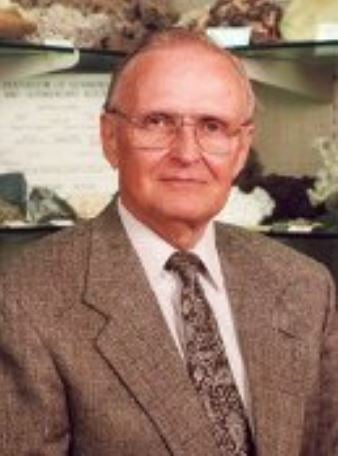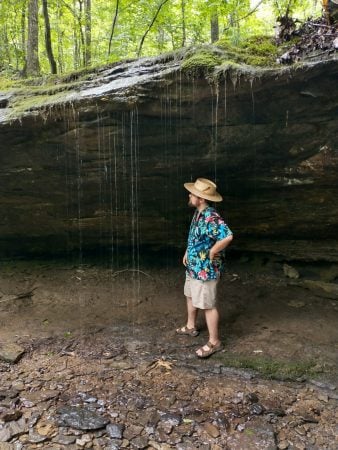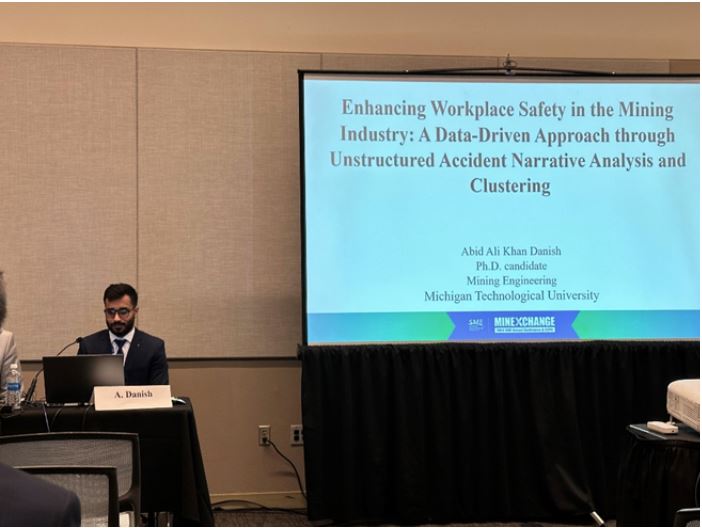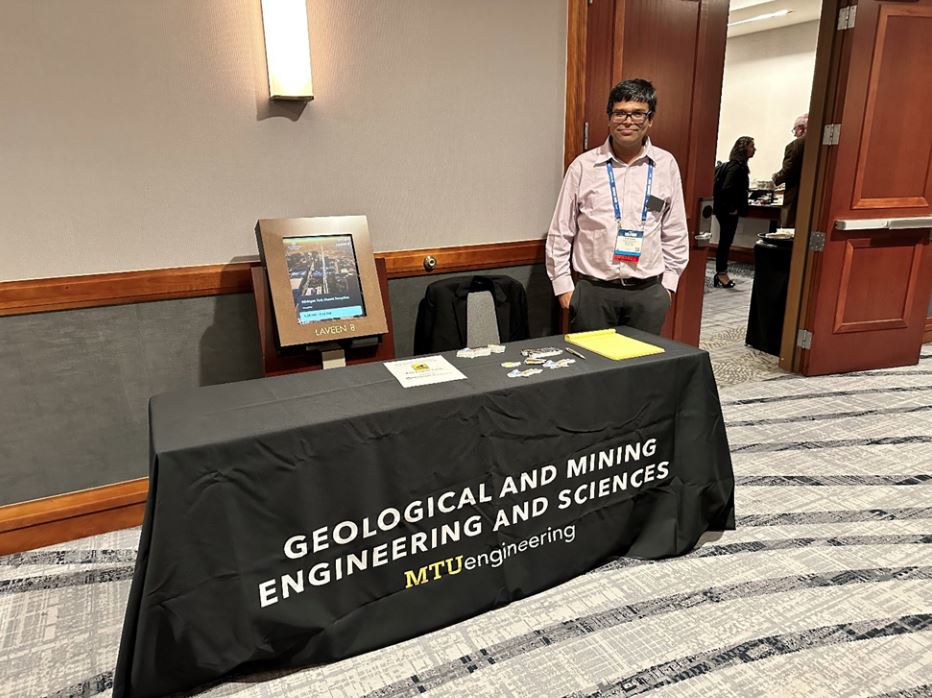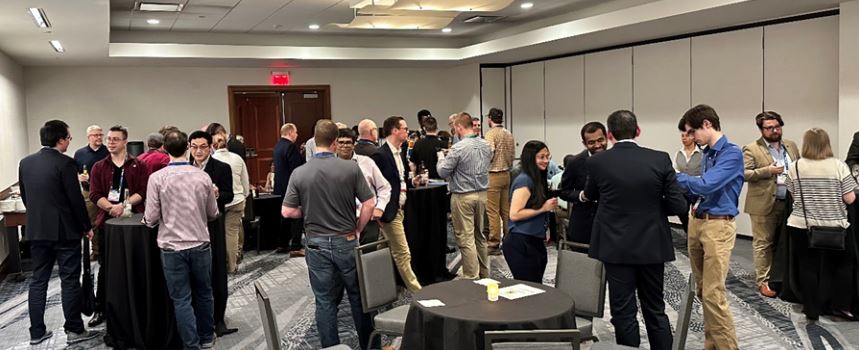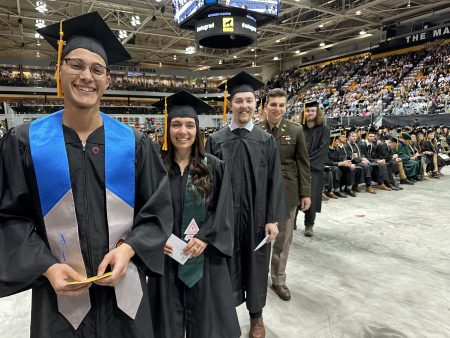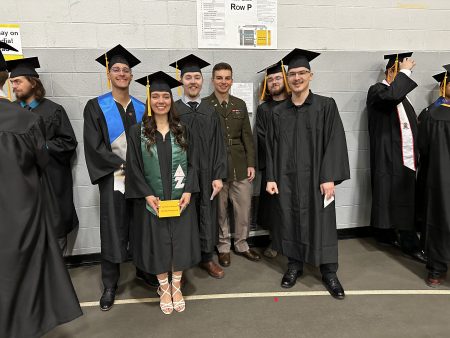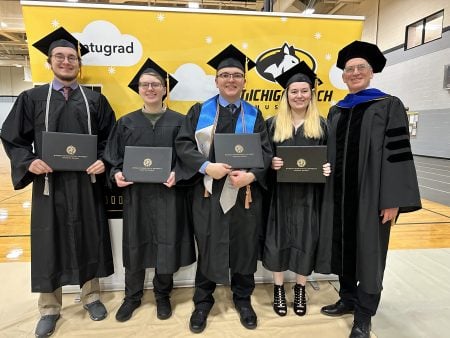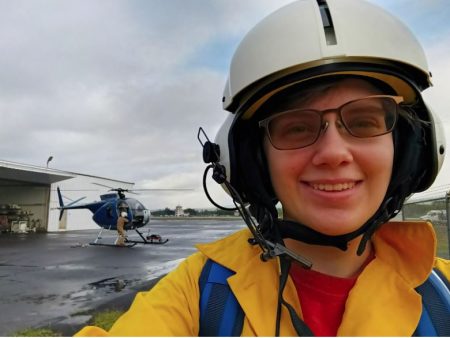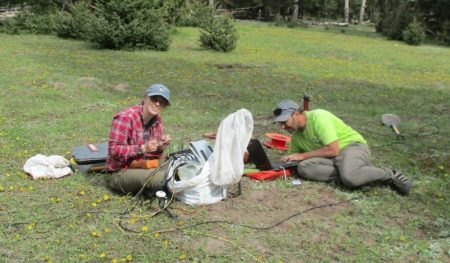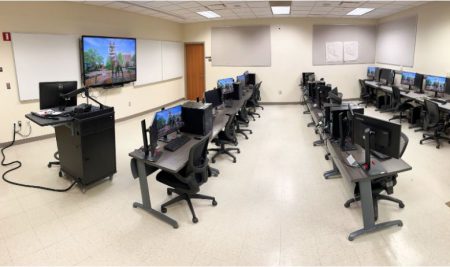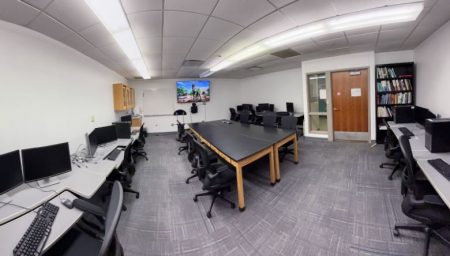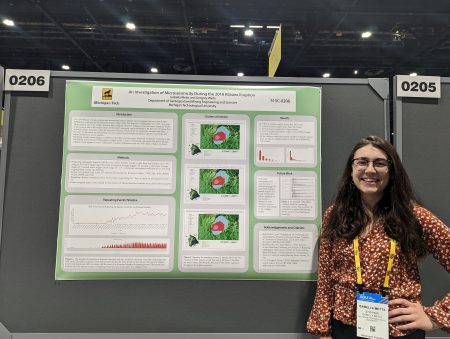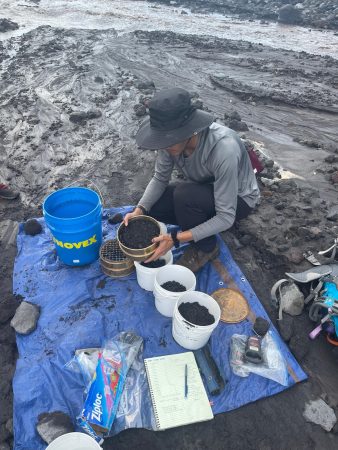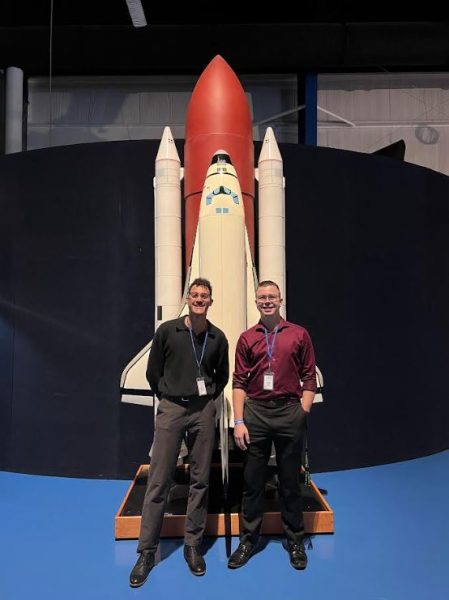We are deeply saddened to announce the passing of Jorma “Joe” Kalliokoski, a professor emeritus and former Head of the Department of Geological and Mining Engineering and Sciences (GMES) at Michigan Tech. He passed away on Monday, June 3, 2024, at the age of 100.
Dr. Kalliokoski received his B.S. degree from the University of Western Ontario in 1947 and his M.S. and Ph.D. degrees from Princeton University in 1951. He was a faculty member at Princeton from 1956 to 1968, when he came to Michigan Tech to become the Department Head. He served in that capacity for 13 years (1968-1981) and retired in 1988. During his tenure as head, the department expanded, the geophysics program joined our department, and the commitment to research and the graduate program was greatly strengthened. Dr. Kalliokoski made significant contributions in the fields of economic geology, Precambrian geology, and mineral deposit research, on which he published multiple papers and reports. He was the Business editor of Economic Geology Publishing Company from 1971-77.
Dr. Kalliokoski was inducted into the Academy of GMES in 1995.
Read Kalliokoski’s obituary and leave a memory if you wish. A memorial service for Joe will be held at Portage Lake United Church on Saturday, June 29, at 11 am. The burial will be in the Forest Hill Cemetery of Houghton.
Exciting news from the GMES department! Our talented students, Anton Smirnov, and Natalie Sorensen, have been featured in the latest issue of Professional Geologist, a publication by the American Institute of Professional Geologists (AIPG).
In her insightful undergraduate essay on page 29, Natalie Sorensen (geological engineering) shares how her geohydrology research has been a game-changer, helping her connect classroom concepts with real-world applications. It’s a must-read for anyone interested in seeing how academic studies translate into practical experiences!
Meanwhile, on page 50, MTU AIPG Student Chapter President Anton Smirnov (geology) discusses the fantastic networking perks of being an AIPG student member. His piece highlights the valuable connections and opportunities that membership has brought him, making a strong case for why every geology student should consider joining.
Check out their stories and get inspired!
A large group of students and faculty from the Department of Geological and Mining Engineering and Sciences (GMES) attended the 2024 Annual Society of Mining, Metallurgy, and Exploration (SME) Conference & Expo, held in Phoenix, Arizona, from February 25-28. The group included seven BS students, eight MS students, one Ph.D. student, and three faculty members (Chatterjee, Manser, Smirnov). This annual conference provides an excellent opportunity for our students to gain exposure to the latest advances in mining engineering research and practice, network with industry professionals, and explore future career paths. The Department provided full or partial travel support to all student participants thanks to the generosity of the Richard Saccany Mining Program Fund, the Robert Hendricks Mining Endowment Fund, and our friends who have supported the Mining Engineering program.
The students in attendance were Cassie Burch, Aiden Harmon, Lucas Maxon, Ian Repic, Nathan Seidel, Anton Smirnov Grady Williams, Theo Asumah, Alfred Yeboah, Rapheka Targbwe, Maxwell Yeboah, Jhuleyssy L. Sanchez Aguilar, Angela Amoh, Isaac Donkoh, Conor Large, and Abid Danish.
This year, our AggCelerate student team made it to the top six nationally in the final phase of the SME/National Stone, Sand, and Gravel Association (NSSGA) Student Design Competition! This annual competition is a demanding two-phase, team-based, problem-solving activity involving a technical design and an oral presentation. The problem highlights the challenges and opportunities associated with operating a sand and gravel quarry, developing an overall design plan, and optimizing the operating methods and economics. Students work on the problem from the perspective of an engineering consulting team responsible for developing the pit and mineral processing plant configuration.
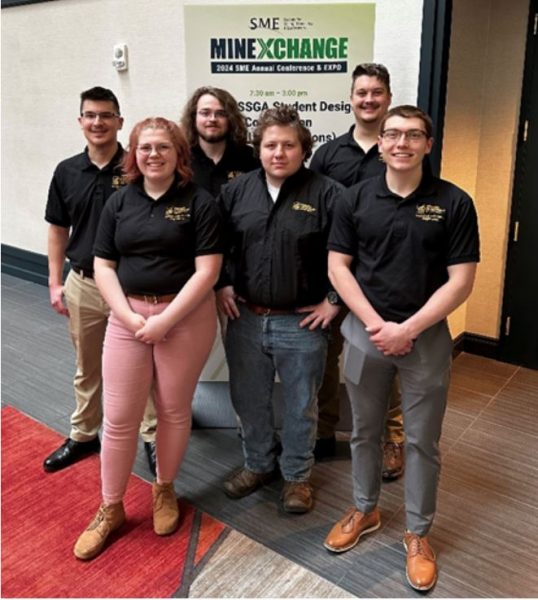
The interdisciplinary Michigan Tech team included mining engineering majors Aiden Harmon, Lucas Maxon, Ian Repic, Nathan Seidel, Grady Williams, and geological engineering junior Cassie Burch. “Under the expert guidance of Dr. Nathan Manser, Professor of Practice at GMES, the team has demonstrated exceptional skill and knowledge in their field,” said Aleksey Smirnov, Department of GMES Chair, who attended the conference. Although our team did not make it to the podium, the judges complimented the novelty of their design solutions.
On the research side, Associate Professor and a Witte Family Faculty Fellow in mining engineering, Dr. Snehamoy Chatterjee, delivered an oral presentation titled “Developing a Recourse Action to Survive Low Commodity Prices in Open Pit Mine Planning.” This research develops a recourse action strategy under an uncertain environment to revisit the mine production planning when metal prices decline.
Dr. Chatterjee’s Ph.D. student, Abid Danish, presented a talk titled “Enhancing Workplace Safety in the Mining Industry: A Data-Driven Approach through Unstructured Accident Narrative Analysis and Clustering.” He analyzed MSHA accident/injury data narratives using natural language models and unsupervised machine learning algorithms to understand the risks associated with mining accidents.
The GMES department co-sponsored and hosted an alumni engagement event. The two-hour social event was well-attended by alumni from several MTU departments, such as GMES, Chemical Engineering, Material Science and Engineering, and other programs and current MTU faculty and students. The event was a great opportunity for everyone to network and catch up with old friends. Overall, the alumni engagement event was a success, and plans for the next meeting in Denver are already underway. We are grateful to all the alumni who attended and look forward to seeing even more of them at future events. This year, the event was co-sponsored by the Department of Chemical Engineering.
Bravo, graduates! Here’s to your endless potential and the adventures awaiting in your future.
Degrees Awarded
Master of Science in Geological Engineering
Clayton H. Donajkowski
William T. Webster
Master of Science in Geology
Hayden M. Chaisson
Master of Science in Geophysics
Sunday Joseph
Aimee Zimmerman
Morgan Wilke
Master of Science in Mining Engineering
Emmanuel Wolubah
Alfred Yeboah
Enoch Nii-Okai
Bachelor of Science in Geological Engineering
Karina K. Constant
Braxton J. Murphy
Bachelor of Science in Applied Geophysics
Brendan Harville
Bachelor of Science in Mining Engineering
Ian G. Repic
Olivia K. Rouleau
Nathan J. Seidel
Maxx D. Tartamella
Award Recipients
AIPG National Student Scholarship – Natalie Sorensen
Outstanding GTA Award Spring ‘24 – Aimee Zimmerman
Outstanding GTA Award Fall ’23 – Dakota Locklear
Outstanding Scholarship Award Sp’24 – Morgan Wilke
Outstanding Scholarship Award Fall ‘23 – Ian Gannon
Department Scholar – Sam Jensen
Field Geophysics Spiroff Book Award – Clarissa Gordon
Field Geology Spiroff Book Award – Anton Smirnov
Summer Undergraduate Research Fellowship (SURF) – Sam Jensen
Estwig Rock Hammer Award – Max Stange
Certificate Graduates
Geoinformatics – Oluwatosin O. Ayo, Clayton H. Donajkowski, Sunday Joseph,
Ashish Mahaur, Eli A. Paulen, William T. Webster, Morgana M. Wilke, Emmanuel L. Wolubah
Natural Hazards & Disaster Risk Reduction – Hayden M. Chaisson, Ryan M. Cocke,
William T. Webster, Morgana M. Wilke
The Department of Geological and Mining Engineering and Sciences is pleased to award five bachelor’s, and two master’s degrees this December.
Two graduate degrees awarded:
Breen, Dillon MS Geology
Advised by Dr. Luke Bowman
Metts, Isabella MS Geophysics
Advised by Dr. Greg Waite
Five undergraduate degrees awarded:
Hawes, Jack W. BS Geological Engineering
Johnson, Samuel A. BS Geology
McClelland, Elliz E. BS Geology
Myaard, John S. BS Geological Engineering
Verran, Maria E. BS Mining Engineering
Congratulations, and best of luck on all future endeavors!
This summer, Elliz McClelland interned in the URISE (Undergraduate Research Internships in Seismology) program, funded by EarthScope (formerly known as IRIS). This internship experience gave them professional research experience, guidance about graduate schools, and the opportunity to work with an institution they’d like to work at during their career. As part of their internship experience, they will also present at the annual national American Geophysical Union (AGU) meeting in December 2023, a completely new experience for them.
During Elliz’s internship, they conducted research into a volcanic caldera using geophysics in New Mexico. Elliz worked under the mentorship of the United States Geological Survey and spent part of their summer working in the USGS office in Denver, Colorado. This internship was a multi-faceted experience where they had the opportunity to do a lot of traveling. Elliz spent their first couple of weeks performing fieldwork in New Mexico in their study area, then moved into Denver to work at the USGS office. They were also lucky enough to work on a separate USGS project where they traveled to Hawaii to help their mentor conduct field research. Their summer was full of new experiences and cultures!
The URISE internship was highly targeted toward providing research experience and preparation for graduate school. While Elliz intends on taking a least one gap year before attending graduate school, the information the internship coordinators provided them about graduate school was instrumental in making their decisions about furthering their education.
When reflecting on the value of the URISE internship, Elliz says, “For my needs, this internship was also immensely useful in determining my career path. I ‘put my boots on the ground’, so to speak, working directly with the USGS under a position I might like to hold myself in the future. My summer experience really confirmed for me that I love doing field work and I would enjoy working for an institution like the USGS.”
In December, Elliz presented their work at the AGU national conference in San Francisco, California. This conference is one of the biggest Earth Science conferences in the nation and is an excellent opportunity for students to meet potential employers, experience the professional research conference environment, and network with fellow geoscientists. For more details about Elliz’s internship experience and the research they conducted, you can visit their summer blog at URISE. Elliz would also like to highly recommend this internship to any geoscience students with an interest in research and geophysics. Anybody can apply and prior geophysics experience is not required! You can stay updated about internship applications at URISE.
Two laboratories at the Department of GMES underwent significant renovations this past summer
1. Upgrading the Mine Design and System Simulation Laboratory
Thanks to the generous support of our Mining Engineering alumni, we replaced all the computers in our Mine Design and System Simulation Laboratory (Dow 709) with new cutting-edge, powerful computers with advanced mine design, planning, and simulation software packages. At the same time, the laboratory capacity was increased to 15 seats. The MDSS Laboratory supports teaching, senior design, and research activities. The lab is fully equipped with the Sharp AQUOS BOARD Interactive Display System, and advanced audio-video equipment. This lab also includes a smart interactive center room for video conferences and online communications. The MDSS Lab is created to enhance and facilitate the potential of teaching and conducting modern mining projects at Michigan Tech. This upgrade will further enhance collaboration and foster innovation among our students and researchers.
2. Introducing the Earth Explorers Computer Laboratory: A Multifunctional Hub
We converted the old seismic petrophysics laboratory into the dynamic Earth Explorers Computer Laboratory (EECL). It is a multifunctional space tailored for GMES students tailored for GMES students pursuing their research, coursework, and senior projects. Designed to foster creativity and collaboration, the laboratory is equipped with several high-performance workstations featuring AppsAnywhere technology and proprietary software. Students have access to many specialized applications, data processing tools, modeling software applications, and image processing. The computers in EECL also provide access to Michigan Tech’s high-performance computing cluster. This dynamic space now features a spacious TV screen, a lectern, and video-conferencing equipment and serves as a geophysics reference library. Additionally, the lab serves as a multi-purpose space, doubling as a classroom for various GMES courses as well as a meeting space for research groups. The room’s ambiance was revitalized with brand-new carpeting and fresh paint, giving it an inviting vibe.
These upgrades enhance the learning and collaboration experience within our department. They ensure more students can access our resources, and provide modern, adaptable spaces for educational and collaborative needs for everyone.
Our heartfelt thanks go to our alumni whose generous donations made these improvements possible. As we embrace the future of learning and research, we are excited about the possibilities these upgrades will bring.
Isabella Metts achieved success in defending her geophysics MS research on November 11, 2023.
Advised by Dr. Greg Waite, with Dr. Luke Bowman and Dr. Simon Carn serving as committee members.
Title: An Investigation of Microseismicity During the 2018 Kīlauea Caldera Collapse
Abstract: The 2018 Kīlauea volcano eruption and incremental caldera collapse was accompanied by more than 60,000 seismic events cataloged by the Hawaiian Volcano Observatory as well as 62 caldera collapse events. The majority of seismicity occurred on the eastern side of the caldera between daily collapses. However, the majority of caldera subsidence occurred to the west. To understand the collapse mechanics behind this variance in subsidence and seismicity across the caldera region, repetitive waveforms and source properties can be studied.
Repeating seismic events suggests a common source that is not moving or destroyed. At Kīlauea, clusters of repeating events can indicate source processes throughout collapse cycles. REDPy, a repeating earthquake detector tool for Python, cross-correlates seismic events to determine repetition. Events are separated into families or listed as orphans if no matches are found. We used data from HVO network stations surrounding Kīlauea’s summit. Possible events were identified using an STA/LTA trigger algorithm with a long-time average trigger of 8 seconds, a short-time average trigger of 1 second, and a trigger on/off range of 1-2.5. A minimum correlation coefficient of 0.7 was used to group over 167,000 recognized events from April 29th to August 2nd into nearly 6,000 families. Of these families, 697 were chosen as ‘clusters of interest’ for including >100 events or persisting for 7 days or more. P wave first motions were manually picked for waveforms associated with clusters of interest. These clusters were then located using P wave arrival times, and focal mechanisms were modeled for viable events to learn more about their source processes and relationship to collapse mechanics.
Dilatational first motions dominate our catalog and indicate crack-closing sources with possible relationships to conduit collapse after magma withdrawal and crack closure due to fault motion. Focal mechanism models produced mismatched station polarities indicative of non-double-couple sources, further aiding the hypothesis that dominant events involve a negative volumetric component. Focal spheres show evidence of ring faulting that is likely responsible for these non-double-couple events through the motion of concave fault structures presenting as repetitive crack closure along caldera margins.
From his first weeks in the GMES Department, Brendan Harville was interested in getting involved in research. Through a handful of well-timed events in Brendan’s first semester, he seized an opportunity to submit a research proposal with Dr. Greg Waite to the Michigan Space Grant Consortium (MSGC) undergraduate fellowship to conduct research regarding “Seismic Amplitude-based Lahar Tracking for Hazard Risk Mitigation at Fuego Volcano in Guatemala.” Brendan’s proposal was selected, leading him to plan fieldwork in Guatemala with fellow PhD student Gustavo Béjar-López. Brendan and Dr. Waite used seismic data to create a model that
can locate and track how lahars propagate down drainages from Fuego’s flanks. The work took many twists and turns (as research often does!) and resulted in an improved understanding of how the morphology of Fuego and its many drainages influence lahars and their impacts. Brendan’s work was accepted by MSGC for an oral presentation at the MSGC Annual Conference on October 21, 2023. GMES student Conor Large accompanied Brendan for his presentation over MTU’s Fall Break.
Reflecting on the entire MSGC experience, Brendan says, “My experience with undergraduate research through MSGC was invaluable. I met, connected, and collaborated with many admirable and inspiring peers and mentors for which I am truly grateful for. Special experiences like these are what invigorate and propel students like me toward future goals and aspirations. I would never have enjoyed this opportunity if I hadn’t pushed through my initial fears and feelings of self-doubt.”
GMES celebrates Brendan’s accomplishment and is proud to have submitted four new MSGC proposals this week for the Consortium’s annual call.
Check out Brendan’s day-to-day field campaign journey in Guatemala through his personally made slideshow: Field Campaign Slideshow (bit.ly/Harville_Guatemala_FieldCampaign)
Dakota Locklear received recognition as an Outstanding Graduate Teaching Assistant for exceptional work during the spring 2022 semester in GE2000 Understanding the Earth. Dr. Snehamoy Chatterjee advises Dakota as he pursues a Ph.D. in geology.
Locklear’s dedication and hard work, which did not go unnoticed, led to his nomination by the GMES Department. To be eligible for recognition as an Outstanding GTA, the candidate must have had sole responsibility for instruction in a lecture or laboratory course or section at any level within the past academic year. His praise as an Outstanding Graduate Teaching Assistant is a testament to his passion for geology and commitment to helping students learn.
Congratulations, Dakota, on this well-deserved recognition!
